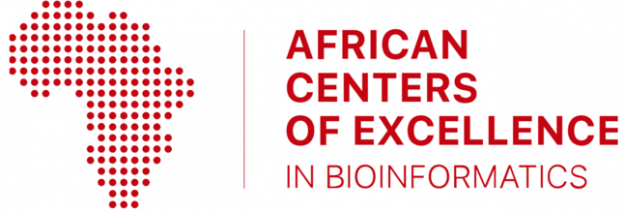One of the core objectives of ACE is to provide a high-performance scientific computing infrastructure to enable biomedical research in the region. Since its inception, the ACE has participated in and supported numerous research and training projects with regional and international research partners. The following are works that the ACE has supported and worked on;
Funder: NIH, Fogarty International Center
PI: Daudi, Jjingo
Date: 2017 – 2022
Title: Nurturing Genomics and Bioinformatics Research Capacity in Africa (BRecA).
Abstract: The grant’s overall goal is to build genomics and bioinformatics capacity in Uganda and the African continent through dedicated and sustainable bioinformatics Masters and Ph.D. programs at Makerere University.
Funder: NIH
Co-PI: Daudi, Jjingo
Date: 2017 – 2022
Title: H3Africa BioNET Uganda node
Abstract: H3BioNet develops bioinformatics capacity in Africa to enable genomics data analysis by H3Africa researchers across the continent. It also works to strengthen continent-wide bioinformatics infrastructure (computational platforms, softwares and teaching materials)
Funder: Bill and Melinda Gates through Grand Challenges Africa Program of the African Academy of Sciences (AAS)
PI: Mboowa, Gerald
Date: 01/June/2019 – 01/May/2021
Title: New Approaches to Characterize the Global Burden of Antimicrobial Resistance.
Abstract: The goal of this study is to understand transmission dynamics and acquisition of antimicrobial resistance at referral hospitals and community settings in East Africa using conventional microbiology and whole-genome sequencing (https://bit.ly/37xtKi9)
Funder: The Government of Uganda through Makerere University Research and Innovations fund
PI: Mboowa, Gerald
Date: 25/July/2020 – 14/December/2020
Title: Face-Masking, an Acceptable Protective Measure against COVID-19 in Ugandan High-Risk Groups
Abstract: Face-masking could reduce the risk of COVID-19 transmission. We assessed knowledge, attitudes, perceptions, and practices toward COVID-19 and face-mask use among 644 high-risk individuals in Kampala, Uganda.
Funder: Bill and Melinda Gates through Grand Challenges Africa Program of the African Academy of Sciences (AAS)
PI: Mboowa, Gerald
Date: 01/June/2019 – 01/May/2021
Title: New Approaches to Characterize the Global Burden of Antimicrobial Resistance.
Abstract: The goal of this study is to understand transmission dynamics and acquisition of antimicrobial resistance at referral hospitals and community settings in East Africa using conventional microbiology and whole-genome sequencing (https://bit.ly/37xtKi9)
Funder: The Government of Uganda through Makerere University Research and Innovations fund
PI: Daudi, Jjingo
Date: November/2019 – March/2021
Title: Data-driven HIV prevention among young adults in Uganda
Abstract: The aim of the project is to develop a Ugandan – specific customized and robust behaviour based HIV risk score for young adults, with the long-term goal of reducing HIV incidence in the country. This is partly achieved through compiling, cohere and normalize countrywide,
generalizable and representative datasets about sexual behaviour among young adults in rural and urban Uganda.
Funder: The Government of Uganda through Makerere University Research and Innovations fund
PI: Daudi, Jjingo
Date: 10/August/2020 – 22/January/2021
Title: Virtual Reality Technology for Optimizing Safety and Competence in Management of Patients with COVID-19 Disease
Abstract: The COVID-19 pandemic poses a significant public health threat like many highly infectious diseases that commonly occur in Uganda. Health worker (HW) training to adequately respond to COVID-19 using the traditional classroom-based training models may not be possible due to COVID-19 transmission prevention measures like physical distancing. We, therefore, carrying out an “Innovative Virtual Reality (VR) model with immersive training scenario simulation”. This project demonstrates the cost-effectiveness and capability of VR technology to build the capacity of HWs in identifying and caring for COVID-19 patients/suspects as well as the proper use of personal protective equipment.
Funder: Training Health Researchers into Vocational Excellence in East Africa (THRiVE)
PI: Mboowa, Gerald
Date: 01/July/2019 – 31/May/2021
Title: THRiVE-Research Enrichment: Community and Public Engagement for Enhanced Impact (RECPE for Impact) Project
Abstract: This project seeks to understand the knowledge and attitude of secondary school students towards HIV transmission and treatment in Nakaseke district, Uganda
Funder: The World Health Organisation through the Structured Operational Research and Training IniTiative (SORT-IT)
PI: Mboowa, Gerald
Date: 25/August/2020 – 31/January/2021
Title: Trends in the antimicrobial resistance profiles in the surgical wards at Mulago National Referral Hospital, Uganda
Abstract:
Funder: The Infectious Diseases Institute, Makerere University
PI: Kiragga, Agnes
Date: 01/July/2020 – 01/December/2020
Title: Leveraging Ugandan COVID-19 Social and Print Media Memes to Optimize Preventive Interventions
Funder: African Doctoral Dissertation Research Fellowship Program Policy, Practice, and Solutions: Research Fellowship Opportunities in Sanitation and Fecal Waste Management in East Africa
PI: Kanyerezi, Stephen
Date: 01/December/2020 – 01/August/2021
Title: Characterizing microbial diversity and resistome in urban sewage using shotgun metagenomics in Kampala, Uganda
Abstract: Recently, antimicrobial-resistant (AMR) infections have shown up as the leading threats to human health, having an estimated 70,000 directly attributed deaths per year worldwide. For Africa, Antimicrobial resistance data is still not available for 42.6% – quite a big number, of the countries. If we don’t address the antimicrobial resistance threat, the figure is approximated to rise to 10 million deaths per year worldwide by 2050 while of these deaths per year, Africa will be having the lion’s share. With the threat this AMR poses to human health, there is a dire need for a strategy that gives surveillance information on the available AMR. In this study, we are to use shotgun metagenomics to characterize microbial diversity and resistome in urban sewage
Funder: International Development Research Centre (IDRC) & Swedish International Development Agency (SIDA)
Co-PI: Daudi Jjingo
Date: 2020 – 2022
Title: COVID-19 Global South Artificial Intelligence and Data Innovation Program
Abstract: The grant’s overall goal is to deliver a set of synergistic, contextualized and equitable end-to-end AI and data systems for targeted surveillance and management of COVID-19 and future pandemics affecting Uganda

